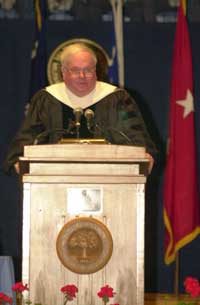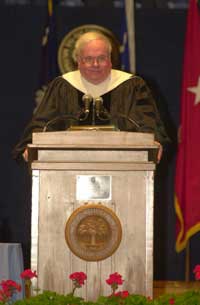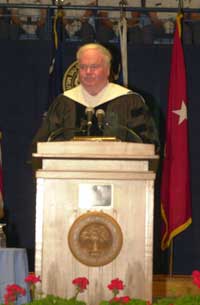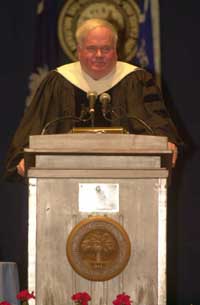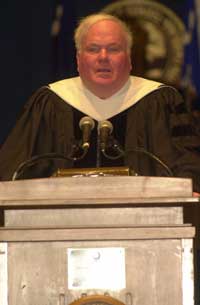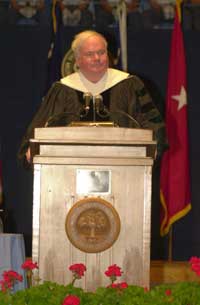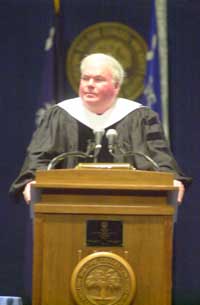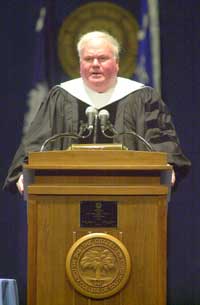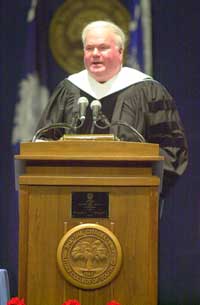13 May 2001
Pat Conroy '67: I wear the ring
General Grinalds; the Board of Visitors; Lt. Col. Thomas Nugent Courvoisie, the Boo, and my first book; Greg and Mary Wilson Smith, The Citadel family who did more than anyone else to bring me back to my Citadel family; Skip Wharton; Rogers Harrell, member of the class of ’01 [who] lost his father last year, and his father will not be able to hand him his diploma, but members of the class of ’71 have rallied here because of the love of that father. Class of 2001, listen up, I don’t have much time. They don’t give you that much time for graduation speeches. Because of various aspects of my character and fates, I did not get to address the Corps of Cadets in the last century. There were many years when I thought that Saddam Hussein or Jane Fonda had a better chance of addressing this class than I did.
In 1979, the year most of ya’ll were born, I was finishing up The Lords of Discipline and I tried to think of a line or words that would sum up better than anything how I felt and how other people feel about this college. I wanted it to be something ringing and affirmative, something true, something to be true for every person who has ever gone through the long gray line. I came up with this line, "I wear the ring."
I think it is the best line I have ever written and the best English sentence I am capable of writing. I love that phrase. I love that sentence. Thirty-four years ago I sat in this field house. My mother and father, my six brothers and sisters, sitting in the audience as your parents are sitting now. My parents—it was their proudest day. My mother wept when I came off [the stage] that day. She wept so hard, and I said, "Mom, what’s wrong?" And she said, "Son, you are the first person in my family who has ever graduated from college, and you did it at The Citadel." And she said, "the best college in America."
Let me tell you something about that mother. Here’s is my mother’s socioeconomic status exactly. Everything you need to know about my family [you can learn] from her mother’s family name. My grandfather, Jasper Catholic Peak; his brother, Cicero. Then there’s Vashtye, Taleatha, Clyde, Pluma. And my favorite—I was cleaning up a grave with my grandmother, Stanny, and I came across this name, "Jerry Mire Peak"—okay, that’s Jerry Mire—M-I-R-E Peak. And I said, "Stanny, who is he named after?" And she said, "He is named after the prophet Jerrymire."
My father was a different case. My father, 6’3, 230-pound Marine Corps fighter pilot, knuckles dragging along the ground when he walked. When he was dying, I interviewed Dad. I said, "Dad, tell me about what it was like in the war."
He told me about coming off the aircraft carrier Sicily in Korea. His was the first squadron that got there, and they said, "Keep the Koreans north of the Naktong River." So he dove down—the first plane the North Koreans had seen—he dove down toward the enemy. I said, "How did you do, Dad?"
He said, "I did pretty good, son." He said, "I had a good sign—they were running. It’s good when you see the enemy running. There was another good sign, son."
"What’s that, Dad?"
"They were on fire."
That was the man who dandled me on his knee when I was a young boy—the Great Santini. I once introduced my father when I was giving a talk like this, and I said, "My father decided to go in the Marine Corps when he found out that his IQ was the temperature of this room."
My father got up right behind me. He stared down at the audience and he said, "My God, it’s hot in here. . . it must be at least 165 degrees."
These were the people who raised me, the people who inspired me. They sent me to this college. They did not ask me where I wanted to go. Both of them wanted [me] to go here. My father applied to this college. I did not. I never saw an application. Never signed an application, but ended up here in 1963 for Hell Week. I remember Hell Week. I don’t know how you did it, kids, but they did it good back then, I want to tell you. And after Hell Night, I remember going there—it was a vivid experience—an upperclassmen came and said, "Mr. Conroy, you look tired, exhausted. Why don’t you come to my room and just hang out for a while."
The next thing I knew I was hanging from the pipes in his room. And I realized that I had come to a place that has etched itself on me, etched itself on my character. I have written more about my college than any writer in American history. My book will be coming out next year—it will be the third book I have written about this college. And I write about it because I cannot keep away from it. . . the experience, it’s so fresh and fiery on my imagination. And because it’s a great relationship, I wanted to tell you something seriously, I wanted to tell my Citadel family how I got involved in the great war of bringing women to this college. After I wrote The Lords of Discipline in 1980 and the reaction of this school, kids, Conroy ain’t stupid. This is a tough place. And I said, "Okay, I have gotten through that," and I was retiring from the field for the rest of my life. I was speaking in colleges in the Northeast. I spoke at Harvard, the Rhode Island School of Design. And then I was looking down at the next college I was supposed to speak at, and to my amazement, it was the Coast Guard Academy. Ladies and Gentlemen, the class of 2001, you probably think I speak at military colleges a lot, but after The Lords of Discipline, the invitations—I got one invitation from VMI. The man who invited me was fired the next day. So I called my wife, and I said, "There’s the Coast Guard Academy. I cannot possibly speak there."
She said, "Yeah, they pay you money. . . "
So I went to the Coast Guard Academy and was met by the guy who invited me, and he said, "Mr. Conroy, I had no idea inviting you would be such a stir." He said, "The commandant told me if you said anything that irritated him that he would fire me even though I had tenure."
So I said, "What do you think I’m going to do, call for the dissolution of the American armed forces?" I said. "This will be great."
The commandant flew up from Washington. He sat there stern faced. I like the way generals can be stern. So he was sitting there stern faced, and I talked to the group, but first of all, I had gone to talk to the freshmen. I talked to these freshmen, and I looked out there, and 25 percent of them were women. I said, "What are you girls doing here? Are you crazy? Are you nuts?"
And one of them there, the woman who was leading me around, said, "Sir, they let women in the academies in 1974."*
And I said to these freshmen girls, "Is it as horrible for ya’ll as it was for me when I was a freshmen?"
A couple of them go—you can’t say anything naturally—but a couple of these young women went [Conroy nods his head].
I talked to the Coast Guard Academy that night. I had a ball. I want to tell ya’ll something—I can talk to a corps of cadets. I talked to them about what happened to me at The Citadel. We roared with laughter. Military colleges—we have common experiences; we share common things. When they took me to the plane the next day, the four women—I asked them—I said, "What are you going to do when you get out of here?"
One of the women said, "Fly an attack helicopter, sir."
"No kidding. What are you going to do?"
"Drive a ship, sir."
So they helped me off then, these four accursed Coast Guard Academy women. And right before I got on the plane, one said, "How’d you like the Coast Guard Academy?"
"I loved it."
Then one of them said, "How’d you like us, sir? How’d you like the women at the Coast Guard Academy?"
I said, "I loved ya’ll. What’s not to like? You’re sharp cadets—funny, smart."
One of them then said, the trap then being set, "Mr. Conroy, when a woman applies at The Citadel, will you help her out? Will you support her? She’s not going to have much."
I said, "Listen, gals, you don’t know The Citadel. That is never going to happen in my lifetime. It’s not even a chance and you just don’t know The Citadel."
And one of the women said, "Mr. Conroy, you don’t know women."
In the early 90s I received a letter from one of those accursed Coast Guard women. "Mr. Conroy, the first woman has applied to The Citadel. We remember your talk. Your talk is famous at the Coast Guard Academy. We especially remember your talking about your time on the honor courts, how much that meant to you. How much that changed you. How much that set your character. And we know because you promised to support the first woman that we can count on you because, like you, we have an honor system we believe in. Her name is Shannon Faulkner. And we know you’ll do your duty."
I tore that letter up. I said, "These women are going to get me killed." But I’m a Citadel man, and they mentioned the honor code. And there’s a lot wrong with me, class of 2001, except this—I know what the meaning of "is" is.
While writing this latest book My Losing Season, I interviewed all the basketball players, the boys I loved from this gymnasium . . . I adored them. They did not know it. I went back to meet all of them, but one meeting changed my life. I went back to see Al Kroboth, center, class of 1969, a POW, a Marine in Vietnam. I sat him down and I said, "Al, you got to tell me about being a POW. You got to tell me everything, but I’m a novelist—you got to let me know how it feels."
"Can I have my wife Patty be with me?"
"Sure."
An interview I thought would take an hour, took seven. And I said, "Al, history is going to come between us." And history is going come all over this, class of 2001. And I said, "Al, I was a draft dodger. I was a Vietnam protester during the war. . . you need to know this before we talk.
He said, "Conroy, you did what you did. I did what I did. I’m fine."
Then he proceeds to tell me about the most harrowing Vietnam experience I’ve ever heard of where he is shot down. He wakes up with an AK-47 pointed at his face. He has a broken back, a shattered scapula. They tell him to get up and Al Kroboth, who is in South Vietnam, in the jungle walks barefoot at night for three months through the Vietnam jungle in the most horrible, tortured thing I have ever heard about in my life.
I said, "Al, how did you make it? How’d you do the pain, the leeches, the boils, the bites—everything?" I said, "How’d you make it?"
Al Kroboth looks at me and says, "The plebe system. I made it because of the plebe system. I made it because I’m a Citadel man."
He gets along. He’s in terrible, terrible confinement in North Vietnam. Then I said, "Tell me when you got out, Al. Tell me how it felt."
He talked about the plane landing. Al’s a Marine, like the general. And Al is standing there. "I didn’t feel anything, Conroy. And then the plane, I saw it go down to the end of the field, and I saw it turn, and I saw the American flag." And as Al Kroboth said he saw the American flag, he wept. His wife wept. Then I wept.
He said then the plane takes off and all of the POWs are in this plane, and he says he’s not feeling anything. And then the pilot comes on and says, "Feet wet. Feet wet. We have left North Vietnamese territory."
And Al Kroboth weeps again, and his wife weeps.
[He said] the North Vietnamese told them that Americans hated the war. They were hated. That they were considered war criminals. So when Al landed, and all of the other POWs in the Phillipines, they got a hero’s welcome from 10,000 people. . . he was shocked when he walked through that crowd, through a red carpet and a little girl sitting on her father’s shoulders handed him a piece of paper. He didn’t look at it until he got on the bus. And in this childish scrawl, this girl had written, "Greater love than this, no man hath."
And Al Kroboth broke again. His wife broke. I broke.
Then Al, on the tenth floor being debriefed, he gets a call that there’s a Citadel man, waiting for him down in the lobby, so he takes an officer down there, and he goes down to the lobby, and Johnny Vaughan, who had been a cheerleader on my basketball team—Johnny used to jump up and down for me and Al—Johnny Vaughan is waiting for Al Kroboth. And he gets down there, and they embrace, and then Johnny says, "Al, I heard you lost your Citadel ring."
And Al said, "The Vietcong stole it."
And then, what to me is one of the great moments, in Citadel history—Johnny Vaughan took off his Citadel ring and said, "I’m not letting you go back to American without wearing a Citadel ring.
He said, "No, Johnny, I can’t do it. I’ve lost too much weight. I’ll lose it.
He said, "No, no. Listen to me, I’m not letting you go back to America without wearing a Citadel ring."
And he took Al’s hand and he put his ring on Al Kroboth’s hand.
Class of 2001, I brought an audiovisual aid for you today. I wanted to bring the type of alumni you are capable of turning yourselves into. I would like Al Kroboth and Johnny Vaughan to stand up and meet the class of 2001. Where are you guys? [Mr. Kroboth and Mr. Vaughan stand to the audience’s applause.]
In closing, class of 2001, I cannot thank ya’ll enough for doing this for me. I did not exactly pencil this speech into my schedule of coming attractions, and you do me the highest honor by bringing me fully into my Citadel family. And I was trying to think of something I can do because a graduation speaker needs to speak of time—time passing. Usually, I tell graduation classes I want them to think of me on their 40th birthday, but I got something else I want to do for ya’ll because I’m so moved at what you’ve done for me. I would like to invite each one of you in the class of 2001 to my funeral, and I mean that. I will not be having a good day that day. . . but I have told my wife and my heirs that I wanted the class of 2001 to have an honored place whenever my funeral takes place. And I hope as many of you will come as you possibly can because I want you to know how swift time is, and there is nothing as swift—and you know this—from the day you walked into Lesesne Gate until this day—a heartbeat, an eye blink. This is the way life is. It is the only great surprise in life.
So I’m going to tell you how to get to my funeral. You walk up. . . You find the usher waiting outside, and here’s your ticket. . . You put up your Citadel ring. Let them check for the 2001, and each one of you, I want you to say this before you enter the church at which I’m going to be buried. You tell them, "I wear the ring."
Thank you so much.
*Women were admitted to the Coast Guard Academy in 1976.


